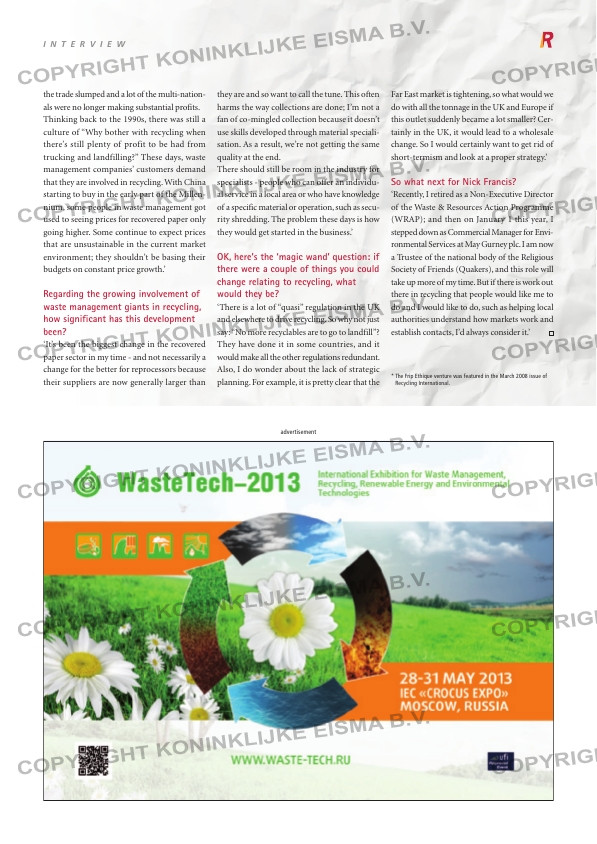Page 25 from: January / February 2013

I N T E R V I E W
advertisement
the trade slumped and a lot of the multi-nation-
als were no longer making substantial profits.
Thinking back to the 1990s, there was still a
culture of “Why bother with recycling when
there’s still plenty of profit to be had from
trucking and landfilling?” These days, waste
management companies’ customers demand
that they are involved in recycling. With China
starting to buy in the early part of the Millen-
nium, some people in waste management got
used to seeing prices for recovered paper only
going higher. Some continue to expect prices
that are unsustainable in the current market
environment; they shouldn’t be basing their
budgets on constant price growth.’
Regarding the growing involvement of
waste management giants in recycling,
how significant has this development
been?
‘It’s been the biggest change in the recovered
paper sector in my time – and not necessarily a
change for the better for reprocessors because
their suppliers are now generally larger than
they are and so want to call the tune. This often
harms the way collections are done; I’m not a
fan of co-mingled collection because it doesn’t
use skills developed through material speciali-
sation. As a result, we’re not getting the same
quality at the end.
There should still be room in the industry for
specialists – people who can offer an individu-
al service in a local area or who have knowledge
of a specific material or operation, such as secu-
rity shredding. The problem these days is how
they would get started in the business.’
OK, here’s the ‘magic wand’ question: if
there were a couple of things you could
change relating to recycling, what
would they be?
‘There is a lot of “quasi” regulation in the UK
and elsewhere to drive recycling. So why not just
say: “No more recyclables are to go to landfill”?
They have done it in some countries, and it
would make all the other regulations redundant.
Also, I do wonder about the lack of strategic
planning. For example, it is pretty clear that the
Far East market is tightening, so what would we
do with all the tonnage in the UK and Europe if
this outlet suddenly became a lot smaller? Cer-
tainly in the UK, it would lead to a wholesale
change. So I would certainly want to get rid of
short-termism and look at a proper strategy.’
So what next for Nick Francis?
‘Recently, I retired as a Non-Executive Director
of the Waste & Resources Action Programme
(WRAP); and then on January 1 this year, I
stepped down as Commercial Manager for Envi-
ronmental Services at May Gurney plc. I am now
a Trustee of the national body of the Religious
Society of Friends (Quakers), and this role will
take up more of my time. But if there is work out
there in recycling that people would like me to
do and I would like to do, such as helping local
authorities understand how markets work and
establish contacts, I’d always consider it.’
* The Frip Ethique venture was featured in the March 2008 issue of
Recycling International.
RI_1-Interview.indd 25 28-01-13 16:35



